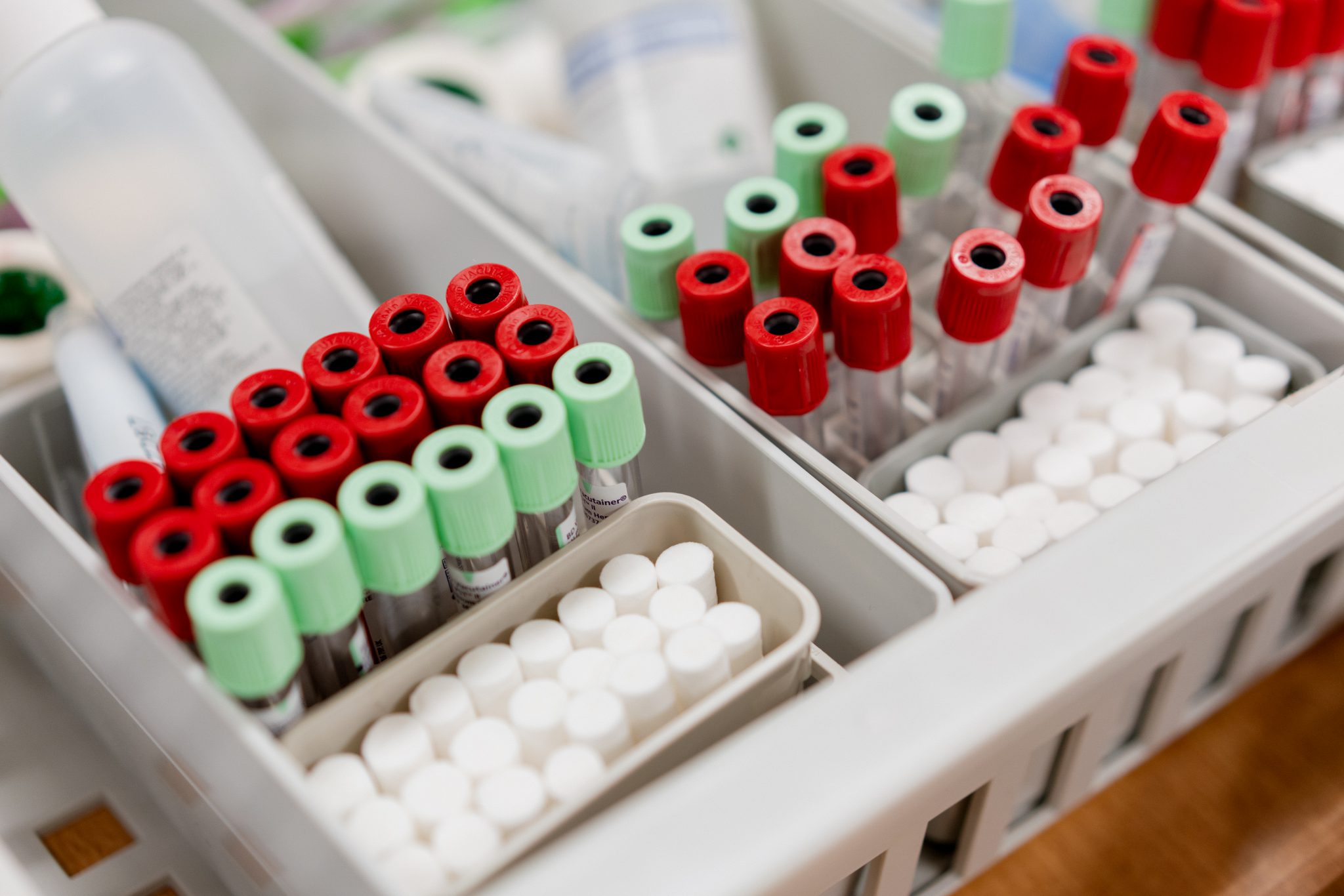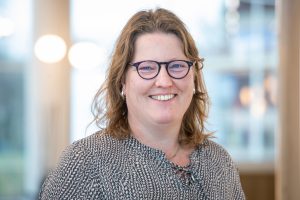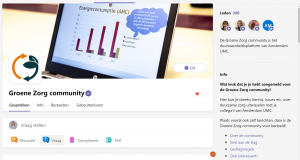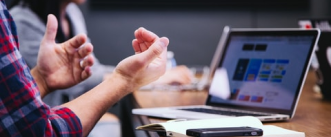
Bringing together health care professionals and Medical Information Science students on an online dynamic platform leads to sustainable solutions
The healthcare sector leaves a big mark on the climate, but this is something most are not aware of. Marieke Sijm, lecturer in Medical Information Science and PhD candidate in Lean Healthcare, wanted not only to raise awareness about the climate impact of the healthcare sector among students in the Faculty of Medicine, but also to get students actively thinking about solutions for making healthcare more sustainable. By connecting students with healthcare professionals through an online dynamic platform, brainstorming on this topic can take place. Marieke Sijm was awarded the UvA Sustainability Scholarship in June 2021 to develop this idea and make educational plans for education through such a dynamic e-platform. Meanwhile, the first pilot was run in November 2021.
 |
Marieke Sijm: lecturer in Medical Information Science and PhD-candidate in Lean Healthcare
More information about Marieke Sijm |
We all need to do something about sustainability
Healthcare is a big polluting sector while our goal is to promote people’s health. Medical Information Science offers many opportunities to make healthcare more sustainable, so I want to encourage students to do their part in this as well. We all need to do something. My eyes were opened to sustainability by the stories of a colleague sitting opposite me in the office. She is privately engaged in this topic a lot. That’s how I came up with the idea of doing more with this important and interesting topic within the program. I became education sustainability coordinator and sat on the education committee, where sustainability was also on the agenda. In addition, I am module coordinator and when one theme within the module needed replacing, I introduced a new module focused on the theme of sustainable care, Organisational Settings of Healthcare. So sustainability came more and more on my path and on the path of the program.
Lean Six Sigma methodology: the best ideas and solutions come from people in the field
I have been teaching the Lean Six Sigma quality improvement methodology for years and am also writing my PhD on it. This methodology is based on the premise that the best ideas and solutions come from the people in the field working on something, not from the consultant on the sidelines. This is clear from research and this realization is so deeply enrooted in my DNA now. In recent years we have seen more and more ‘green’ initiatives coming from the work floor, because people like to do something themselves. An example are the Greenteams in hospitals, where employees voluntarily develop initiatives aimed at making healthcare more sustainable.
I have had many discussions with people in the field, people from the Medicine and Medical Information Science programs. This gave rise to the idea of bringing students together with people in the field, healthcare professionals, to exchange ideas about sustainability within the healthcare sector. I wanted to connect students with healthcare professionals in a variety of roles: from hospital waste management and healthcare providers to procurement and, of course, environmental coordinators. Within such an interdisciplinary community, people often come up with good and usually simple solutions that pay off handsomely. I already literally took the students to different healthcare departments to connect them with healthcare professionals, but an online platform is the easiest way to bring people together. A platform like that in the healthcare industry, that hadn’t been experimented with or researched yet. I heard about the Sustainability Grant through the grapevine, applied and got the grant so I could start developing this.
Work process and lessons learned
I was awarded the grant fall 2021 and had one year to develop my project. It represents 80 hours in total, for which I was released by my supervisor to work on this project. I also used a student assistant who researched, for example, the success factors, best practices of online platforms. From those findings, we designed an English-language online platform via Sharepoint and ran a pilot with it in an English-language elective.
The conclusion was that it is very difficult to use English as the working language on such a platform, because many care workers would still communicate in Dutch or saw English as a barrier to using the platform. That’s not going to work, then such a project cannot ‘fly’. In our master all education is in English so a Dutch platform is not an option. The bachelor is Dutch-speaking so that seems a better place for the platform. Thanks to a core team of enthusiastic promoters of sustainable care, there is now a platform via Teams, extended with Yammer. We currently have 280 members who share experiences and ask questions, whether or not related to education. All employees of the Amsterdam UMC and students of the Faculty of Medicine of the UvA can participate in the platform. Once a student has graduated, the membership stops.
Sustainability Grant gives impetus, importance and visibility
Without this grant, it would have taken much longer to develop my project, because there would be no budget and less time. So this grant really gives an impetus. Applying for the scholarship forced me to formulate a concrete assignment. The fact that I could hire a student assistant to figure out certain things, which I didn’t have time for myself, sped up the process. The peer review meetings with the other teachers who have had scholarships, which TLC organizes once every two months, also help you in your process. It is a stick to present something then and make progress. The interaction with other teachers inspires. To hear what they are doing and how they approach something. Moreover, you help each other with feedback if you get stuck and you use each other’s teaching materials, such as a rubric for assessing assignments.
Furthermore, such a grant also gives your project visibility. For example with the vice dean and the program director. This grant confirms that Sustainability is an important topic. The use of the platform was even officially announced in a speech by the board of directors. More and more things have started to roll around this theme within the program since I received this grant.
A Facebook-like meeting place
Learning environments are usually limited to the educational environment, but students learn outside of that as well. This platform provides that opportunity. It brings students together with people from the field, so that ideas can emerge and be shared. It is important for students to search for information themselves, especially in the field of sustainability.
 |
The platform has been in use for over a few months now. Every student from the Faculty of Medicine can become a member and participate immediately. It is a Facebook-like environment with general background information, where members can share something, ask questions, answer and give feedback, hold polls. At first, most of the content comes from a small select group of boosters, but we see more and more other members sharing content as well. |
People find each other through the platform. For example, I met a lecturer whose subject is social psychology who also has sustainability in education as a theme, and a lecturer who is concerned with internationalization and sustainability. Students like to go abroad for their internships, but traveling also means a large environmental footprint. This lecturer felt it was important for students to think about how they can contribute to sustainable development goals in the country of destination. He wants to raise that awareness. And last week I spoke to someone who teaches about the effect of global warming on the spread of infectious diseases.
A tidal wave of concrete ideas, solutions and outcomes through the platform and work location visits
Three students have now chosen the theme of sustainability for their final project as a result of the education on and attention to this topic and the train of thought ‘what can you do yourself in this’. There are also two students who are doing short internships in the context of sustainability. Site visits with the education often lead to very concrete recommendations by students. They see things that healthcare professionals have become blind to.
An observation made by students when visiting the operating room was that a patient’s arm was held in a certain position by a huge amount of gauze. Then a student asked, why they didn’t use a towel for this. A towel can be washed and reused, while gauze is thrown away.
Another student got the idea from a site visit to an operating room to sterilize the surgical set more efficiently. A group of students then developed a model and associated process to determine the optimal set of instruments so that there are fewer unused instruments ready to go during operations. This not only saves sterilization materials and time, but also money.
Another student wondered why the TV screens showing room occupancy are on day and night, even when no one is working, or when employees are not looking at them. Those screens could be put on economy mode and turned on only by the person who needs it at the time. This saves energy and heating. Furthermore, an idea to purchase materials and medications more intelligently has emerged and is now being looked at to see if it can be put into practice.
There are also ideas about a system that allows the doctor to make the most sustainable choice when prescribing medication, for example by giving the most sustainable products a certain color code. Through the site visits and the platform, a whole chain, almost a tidal wave of initiatives and ideas for saving, against waste, has emerged. The roll-out and implementation of ideas lies with the work departments, or the Greenteams can take it further. You see that some teams get everything done and others fail. Perhaps because one team knows how to involve the right people at the right time and the other does not. A student is now doing research on that as well.
Future plans
By now, the hours I received through the grant have been used up, but I still have plenty of plans to introduce the topic of sustainability further into education at the Faculty of Medicine. There are plans to organize research internships with a sustainability theme and a start has been made with a working group to include sustainability in the education of the Faculty of Medicine. Integration is the magic word, by which I mean integration of this topic into existing education, but also integration of sustainability with, for example, themes such as inclusiveness and internationalization, and of course integration of education with practice.
We are going to formulate goals annually with the core team on sustainable care for the coming year, and at the end of the year look at what we have achieved in order to continue to make our faculty more sustainable. The time for sustainability is now. Whereas before many colleagues were still skeptical, now everyone sees the need. Fortunately, that awareness is growing
Tip from Marieke:
It’s important to realize that an idea is not good all at once. You have to keep polishing and keep trying until it works. You learn from outcomes that were different than expected. Do not get stuck in disappointment, do not give up and keep searching. A slammed door opens a new door elsewhere. For example, I was very disappointed that an English platform didn’t work, but I’m glad that it now works successfully in Dutch.
More information about Marieke Sijm
Marieke Sijm, lecturer in Medical Information Science and PhD candidate in Lean Healthcare was chosen as the best master lecturer of the Medical Information Science program in 2020. Very motivating as a ‘newcomer’ in education, after she made the switch in 2016 after 18 years in the business world. At the time, the choice for business was a very conscious one, because of the opportunities to develop and broaden horizons outside the university world and the hospital. After 18 years, she felt it was time to pass on her knowledge to the younger generations and made the choice to return to the university and the healthcare field, within the program in which she once graduated herself.
More information about the bachelor Medical Information Science and the master Medical Informatics
More about the UvA Sustainability Grant
More than ever, the impact of human intervention on our planet is coming to light. Therefore, UvA invests in education on green sustainability combined with related social sustainability aspects and considers it important to pay attention to this in its educational programs. The UvA Sustainability Grant, organized by the IIS in collaboration with the Teaching & Learning Centre (TLC), recently won the 3rd prize in the SustainaBul sustainability ranking and the 5th prize in best practices. https://sustainabul.com/ The UvA Sustainability Grant is awarded to 6 UvA lecturers in June 2021. The lecturer will have one year to develop the project supported with 80 hours of time.
Take a look at the UvA Sustainability Grant





